SUMMER ISSUE 2025:
July 20, 2025
Welcoming and Affirming
In Denver, historic queer-affirming churches are reinventing themselves as cultural and community hubs. Through inclusive leadership, creative outreach, and interfaith collaboration, they provide radical welcome, preserve spiritual connection for marginalized groups, and adapt sacred spaces to meet 21st-century needs and values.
By Alex Elmore
USE ARROWS TO MOVE THROUGH IMAGES
“For some people, especially in younger generations, it’s not that they intentionally wanted to leave religion, but they didn’t know where they could go to find a place where they could be themselves and that reflected their values,” says AJ Bush, Pastor of Congregational and Community Engagement at Trinity United Methodist Church in Denver. “They have one narrow picture of what church is and oftentimes that’s a very exclusive, hateful, traumatic experience. So, they leave that but not necessarily wanting to leave spirituality, or community, or religion. They just don’t know that there’s another avenue for them.”
Surveys support this generational shift of younger people away from traditional organized religion. A Pew Research survey of adults from 2007 to 2023 showed numbers of non-religiously affiliated adults, or “nones,” peaking in 2022 just above 30% and dropping only slightly to 28% the next year.
Some of the dividing factors between religious and non-religious adults are inherently political–namely queer, female or people of color in leadership positions within the church–but they are not necessarily new contentions.
The United Methodist Church did not exist under its current name until 1968. Upon its founding by John and Charles Wesley in mid-1700s England the religion was the Methodist Episcopal Church, and it had abolitionist leanings. However, one of the first major splits in American Methodism occurred over that very issue, beginning in 1840 with the election of a pastor who owned enslaved people and ending in 1846 with most of the southern and slavery supporting churches forming a separate denomination. They did not reunite for nearly 100 years.
The 20th century found many Christian and Jewish denominations confronting debates about human sexuality since at least the 1970s. One of the earliest Christian denominations to experience a split over sexuality were the Baptists. In 1987 a group left the conservative Southern Baptist Convention, which still holds staunchly anti-LGBTQ+ views, to form the Alliance of Baptists. They also note being the first of any Baptist group to issue a formal apology for “the sins of slavery” in 1990. Less than a decade later in 1993 the Association of Welcoming and Affirming Baptists formed.
First Baptist Church of Denver is a part of the latter group.
“This is a part of our DNA. While we haven’t always been explicitly welcoming and affirming, the reality is we’ve been, at least in Baptist circles, on the forefront of that,” says Kurt Kaufman, Ministerial Associate at First Baptist Church. “As a congregation we’re much stronger because of that.”
“I always offer to people that these things actually aren’t new in the church life,” adds Reverend T. Scott Pegues, First Baptist’s Pastoral Associate. “There have always been two or three people in the corner saying, ‘One day we’re gonna be like this...’ I don’t even like to think of it as innovative. Our holy text tells us we’ve got to be welcoming and affirming to all… Yes, the church is evolving but it's actually becoming true to itself.”
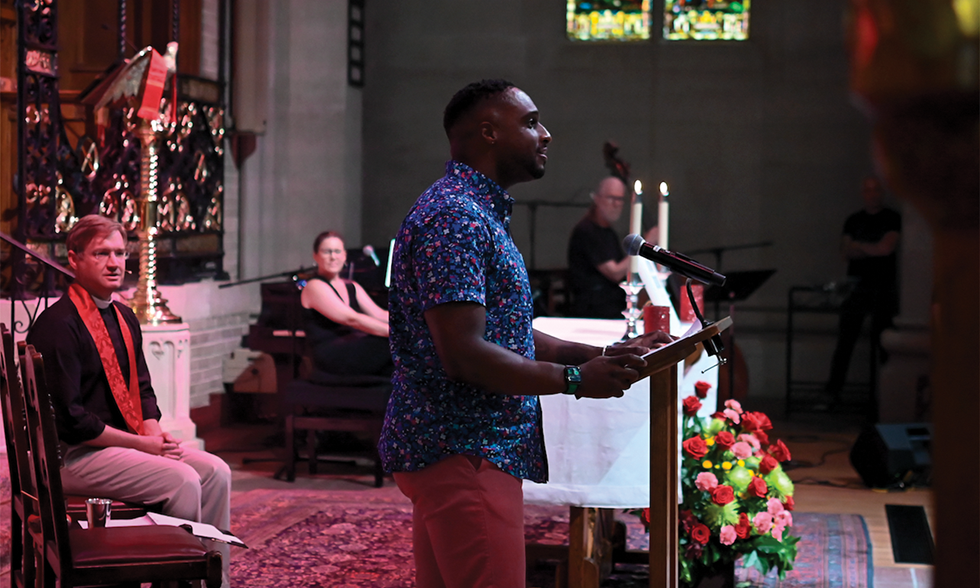
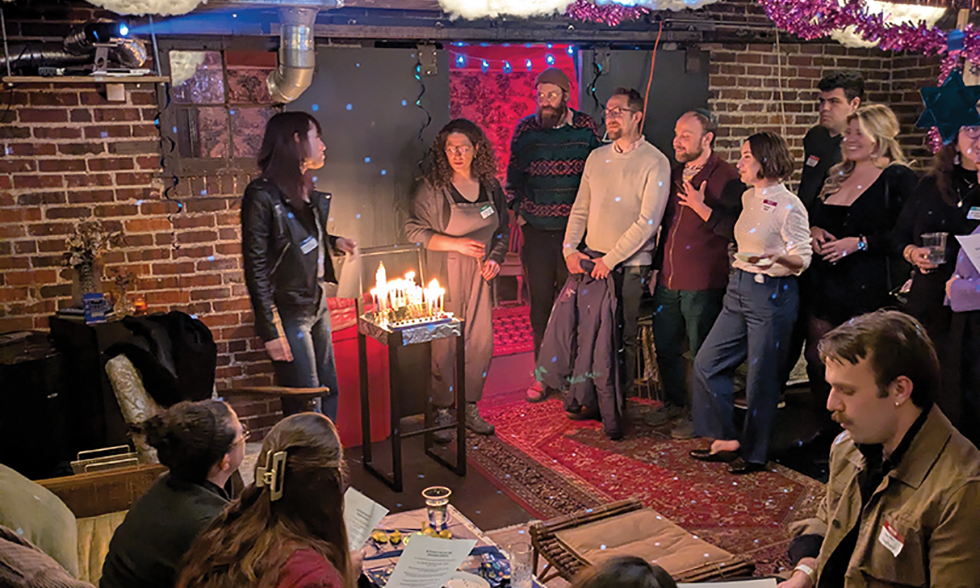

First Image: Revival at the Wilderness. Credit: Bradley Jackson. Second Image: Judaism Your Way -Nature, Gratitude, and Awe.
Pegues left the Baptist church for nearly 20 years despite being raised in it as he wrestled with the forced silence of those who dissented against doctrine. He only joined First Baptist in the last decade and started ministering in 2019. First Baptist of Denver has had their share of protestors interrupting services with trumpets and signs, says Kaufman. They now find themselves at a crossroad again as they search for a new senior pastor. Kaufman and Pegues are part of the four-person interim pastoral team.
Former senior pastor Brian Henderson’s queer identity sent enough shock waves through Colorado to receive a lengthy story in Westword in November 2013. First Baptist hired Henderson after serious depression and a suicide attempt, both spawning during his closetedness while head of Calvary Baptist Church, landed him in the hospital. The decision to hire Henderson is one the church is still extremely proud of for continuing a legacy of welcoming change makers such as Martin Luther King, Jr. and Jesse Jackson, who both spoke in the downtown church. It also forced First Baptist to re-write their doctrine to meet the “affirming” half of welcoming and affirming, as Henderson became the church’s first openly queer pastor.
The GALIP foundation, which stands for “God’s Agape Love (put) Into Practice,” runs Gaychuch.org. The directory allows churches to self-submit to a reviewal process before being publicly listed as affirming. It tallies upwards of 70 such churches across the entire Centennial State. It does not include online-only religious communities.
Both Trinity and First Baptist have been reassessing the use of their buildings as of late. One of First Baptists’ current projects is the redevelopment of their parking lot as a 9 story, multi-family residence. Trinity’s 1888 modern gothic cathedral, though the church’s first building was located elsewhere in downtown 18 years prior, is returning to its roots as a community hub. At the time of its opening Denver’s lack of infrastructure led designer Robert Roeschlaub to number every individual seat in the pews so that the church could function as a cultural venue outside of Sunday services. Recently Trinity partnered with Tattered Cover to invite authors such as Ibram X. Kendi in for guest lectures, and hosted Candlelight concerts. In early June they will kick off Pride month with the Denver Gay Men’s Chorus providing that Sunday’s music.
Not all of the queer friendly houses of worship are physical buildings though. Judaism Your Way, founded in 2003, has no building at all. The organization rents offices for full time staff and finds locations for its services on an as-needed basis, often through using space at First Universalist Church of Denver.
Rabbi Caryn Aviv, Rabbinic & Program Director of Judaism Your Way, jokes that this is a continuance of being “wandering Jews.” It also saves the queer friendly organization overhead each year to instead finance its outreach.
Some of their events disregard the indoors altogether. Aviv hosted Nature, Gratitude, and Awe outdoors at Washington Park. She describes the event as spiritual contemplative practice, or more simply “tree hugging.” The event was structured as a scripture reading about nature, followed by engaging in nature. Though 65 people showed up, more joined spontaneously, often after surprise at learning the group was Jewish. Similar turnouts have happened at High Holidays hosted at the Botanic Gardens.
Aviv’s gender and sexuality have been points of contention throughout her life. In the 1980s, a debate over female rabbis dominated the religious conversation. In the next decade the focus fell on queer rabbis. This also coincided with Aviv’s coming out as a queer woman and her question of whether to become a religious leader.
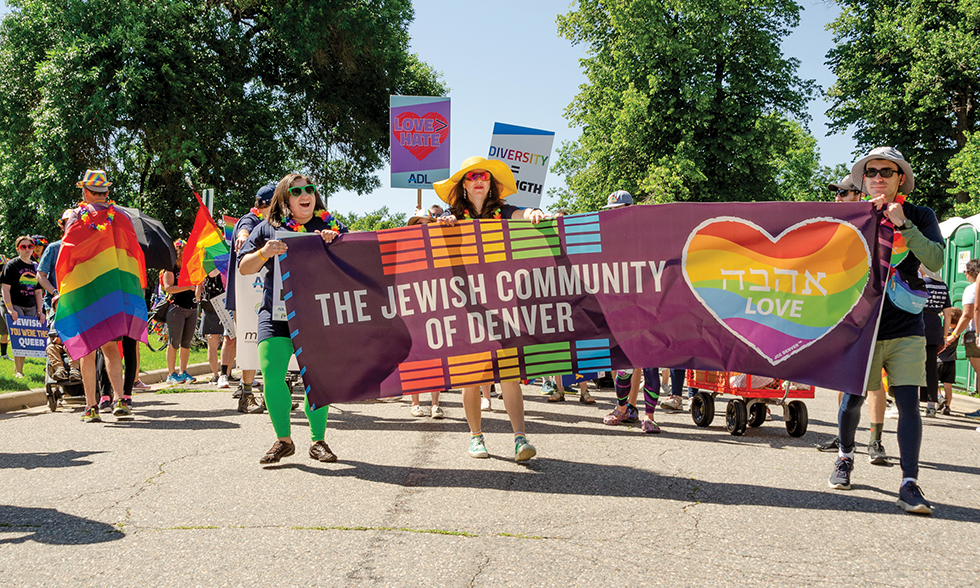
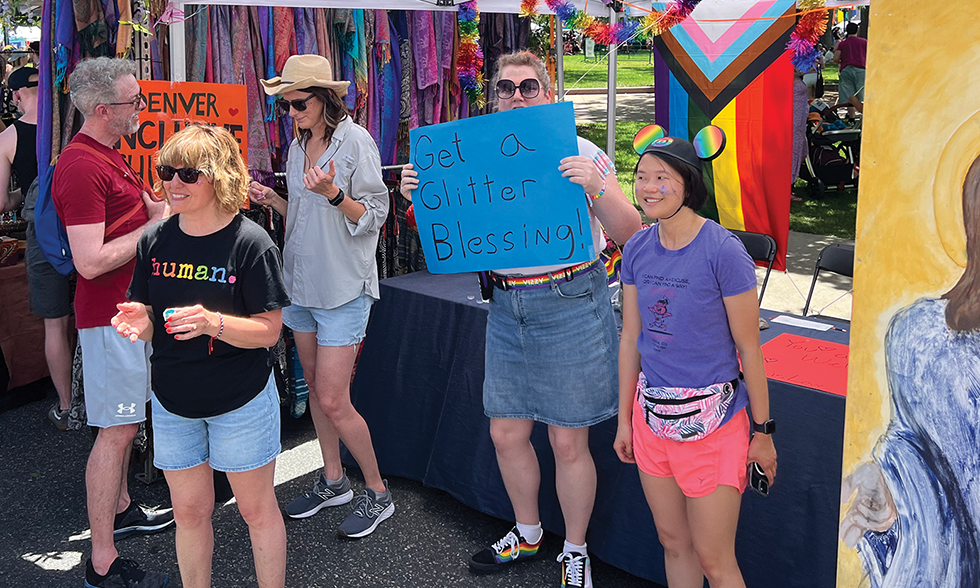
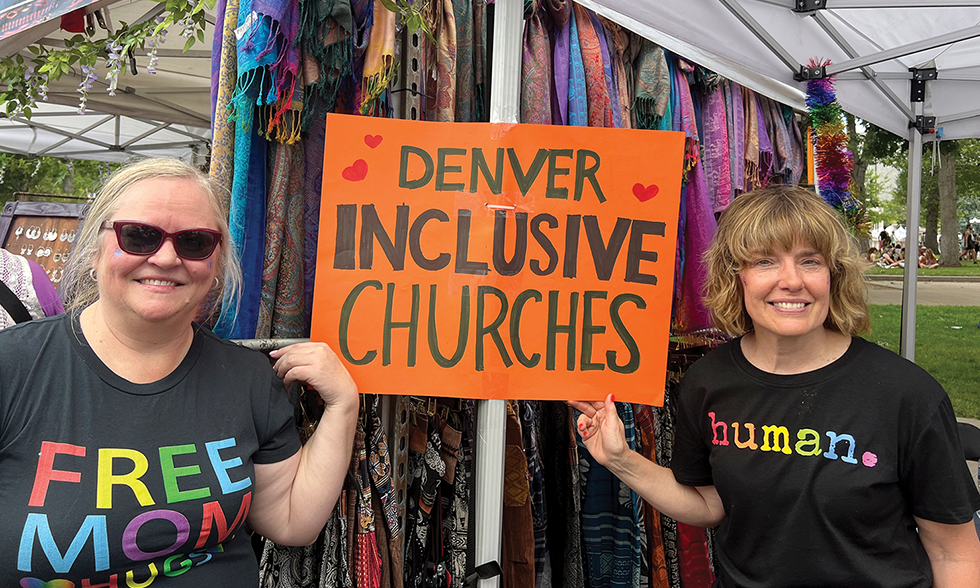

First Image: Jewish Community Church in the Pridefest Parade, 2023. Second and Third Images: Trinity United Methodist Church at Pridefest, 2024
“I am not gonna go back into the closet for five years and lie about who I am when I’m training to be a rabbi, so I’m just not going to be a rabbi in this movement,” she thought. She became a professor instead, focusing much of her studies and activism on queer inclusion in Jewish communities. Queer Jewseven became Aviv’s first book, an essay collection she co-edited.
“In the twenty plus years that I’ve been working on this issue, the Jewish community has totally transformed for the better,” she says. “It’s no big shake that I’m a dyke on the stage leading High Holidays service. Whatever. I’m super-duper out.”
Though on the other hand she feels there is currently a dangerous amount of “backsliding” into more patriarchy, homophobia, and transphobia, both in religious and secular circles. It’s a feeling she finds both intimidating and empowering, knowing she has no plans to back down in her work.
At Saint John’s Cathedral, an Episcopal church in Denver, Enrique Cintrón serves as the Digital Ministry Coordinator. They moved here a few years ago to be with their now-husband before becoming staff. They find the church to be a vital place for the queer community because of its group of queer elders, people who have been activists and met their partners through St. John’s. It can be difficult for many younger queer people to find that connection which leads to mentorship, as would-be elders passed on before their time, they say.
The Episcopal Church itself was an earlier acceptance of queer clergy. In 2003 Gene Robinson became the first openly gay bishop–of any Christian denomination, by most accounts. In interviews Robinson made sure to emphasize that he was merely the first open bishop, far away from being the first queer bishop. His confirmation received death threats from bigots, and he was made to wear a bulletproof vest during the ceremony. Now, more than 20 years later, the Smithsonian National Museum of American History displays his vestments.
But just because these artifacts are in a museum does not mean queer acceptance is exactly commonplace.
“Our role continues to be to do what Jesus calls us to do and to live out our faith, which is to love people as they are. To welcome them and to minister to the most vulnerable people in our society,” Cintrón says. “Especially now in this political climate, there’s so much animus for people that are different from us. This is something that shouldn’t be radical, but it is a radical thing to say ‘All people are welcome here. All people are welcome to be part of this community.’ I think the future lies in us continuing to be that place of radical welcome and embrace and to let people know there’s a place at the table for you here.”
A coalition of Welcome and Affirming churches, including Trinity, took their acceptance to the streets, literally. They marched in the Denver Pride parade down Colfax and staffed a festival booth in Civic Center Park last year. Their offering? Glitter blessings. Similar to the practice of donning ashes during Lent in the Christian church, glitter was placed upon one’s forehead, or other parts of the body as requested, and not necessarily in the shape of a cross either. While sponsored by a group of churches, any of the thousands of guests could receive a blessing without the price tag of a religious sermon or being asked to join a church.
“It’s not proselytizing,” says Bush. “It’s meeting people where they’re at and saying ‘You’re a beloved child of God. Here, have a blessing.’”
----
M
About the author
An Alabama native, Alexander Elmore is the Head Researcher of the Webby award winning podcast Dark History with Bailey Sarian and Director of Marketing & Film Programming - Features at Denver Documentary Society. He holds a B.F.A. in Film and Television from the University of Colorado Denver. His reporting has appeared in The CU Sentry, Looper, and Westword. He has screened work at Denver Film, International Film Series at CU Boulder, Jersey Devil, DracFest, and internationally with 48 Hour Film Project.
Since 2004, METROMODE has been a beacon for the LGBTQIA+ community and our allies. We’re a publication built on quality, not only in our advertising clients but in the look, feel, and editorial pieces of each magazine. METROMODE speaks to the entire community with thoughtful analysis of local, national, and global events affecting our community; developments in business, finance, the economy, and real estate; interviews with emerging and seasoned artists, musicians, and writers; appealing new opportunities to enjoy Colorado’s rich culture and social atmosphere; quality aesthetic experiences from film, to food, to music, to art, to night life; and challenging social and political thought.
MORE FROM METROMODE
CONNECT WITH US




© 2024-2025 METROMODE magazine. All rights reserved. Use of this site constitutes acceptance of our User Agreement and Privacy Policy and Cookie Statement. METROMODE magazine may earn a portion of sales from products that are purchased through our site as part of our Affiliate Partnerships with retailers. The material on this site may not be reproduced, distributed, transmitted, cached or otherwise used, except with the prior written permission of Metromode magazine.






